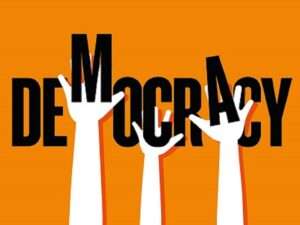The Volokh Conspiracy
Mostly law professors | Sometimes contrarian | Often libertarian | Always independent
Biden's Withdrawal From the Presidential Race Is Not Anti-Democratic
Among other reasons, it's actually supported by a large majority of voters, including most Democrats.

There's plenty of room for disagreement over whether President Biden's decision to withdraw from the presidential race is a good development, or not. But one common trope that deserves to be rejected is the idea that his withdrawal somehow undermines democracy. This argument was first deployed by die-hard Biden backers, but has more recently been taken up by Republicans. For example, GOP House Speaker Mike Johnson complains that "[h]aving invalidated the votes of more than 14 million Americans who selected Joe Biden to be the Democrat nominee for president, the self-proclaimed 'party of democracy' has proven exactly the opposite."
I am skeptical that Johnson and other GOP leaders actually care much about the will of Democratic voters. If they did, they would not have supported Trump's efforts to overturn the 2020 election (which, if it had succeeded, would have been a genuine massive affront to democracy). But even aside from the glaring hypocrisy, the argument has little merit.
Start with the obvious point that democracy does not require Biden or any other candidate to stay in the race if he or she concludes he wants to get out - even if the motive for dropping out is that the candidate believes there is no longer much chance of winning. Similarly, democracy doesn't preclude politicians, activists, and other elites from urging a candidate to leave the race, or even from threatening to withdraw their support if the candidate refuses to listen. All of this is itself a part of the democratic process. Subject to a few legal constraints, voters and elites can choose to give or withdraw their support, as they choose. And they can urge a candidate to drop out, if they want to.
If democracy is about following the will of the majority of voters, than Biden's withdrawal clearly qualifies. Survey data indicates a large majority of Americans, including some 65% of Democrats, wanted Biden to drop out, so the Democrats could select a different candidate. It's hard to argue that the democratic prerogatives of primary voters were somehow violated when most of those voters themselves wanted Biden out.
And it's also hard to argue that voter preference was a result of manipulation by elites. If anything, most voters regarded Biden's age and infirmity as a serious weakness long before most Democratic elites decided it was. Biden's troubling performance in the June 28 was a kind straw that broke the camel's back. Even viewers who don't follow politics closely and pay little attention to the views of elites could see something was wrong. My nine-year-old daughter - who had never previously watched a presidential debate - commented that Biden looked old and "overwhelmed." Was her reaction somehow dictated by nefarious Democratic elites? Pretty obviously not.
Moreover, democracy doesn't require parties to use primaries to select candidates in the first place. Throughout most of American history presidential candidates were selected by party leaders at conventions and in the proverbial "smoke-filled rooms." Democracy came in because those leaders had incentives to select candidates likely to be popular with general election voters. Indeed, one disadvantage of primaries is that they often tend to advantage candidates who cater to the extremes of the party's base, but are less appealing to general election voters, thereby actually being less responsive to the majoritarian preferences of the voting public, as a whole. In that respect, primaries are actually a relatively less democratic way of choosing candidates than selection by party elites would be.
I am no great fan of Kamala Harris (Biden's likely replacement on the Democratic ticket), and she is not the candidate I would have chosen, if it were up to me. But her ascension clearly has the support of a large majority of Democratic voters. Democracy doesn't require the party to choose a candidate I like, and it certainly doesn't require it to choose one the Republicans would prefer to run against.
The fact that Biden's withdrawal wasn't undemocratic does not necessarily mean it was a good thing. I have long emphasized that democratic processes aren't always good, and should be constrained in many ways. Such constraints are justified by the dangers of voter ignorance, tyranny of the majority, and other pathologies. In this particular case, I happen to agree with the majority of the public in thinking that Biden's withdrawal was, on balance, a good thing. But it would be wildly inconsistent for me to argue I'm right merely because majority public opinion - for once! - happens to be on my side.
If you're a Democrat who thinks Biden is preferable to Kamala Harris or a Republican who would rather have Biden as an opponent because he would be easier to beat, you have reason to lament his downfall. But you should not condemn it as undemocratic.
In addition to the argument that Biden's withdrawal was undemocratic, there is the closely related - but much more ridiculous - theory that it was a "coup." I'm not going to argue against this idea at any great length. Those who believe it are probably beyond rational persuasion. I will only say that a real coup involves violence, or at least the threat of it. The January 6, 2021 attack on the Capitol is plausibly described as a coup, though it is more accurate to call it an insurrection. Biden's withdrawal wasn't anything like that. Perhaps he got a raw deal; but a coup it was not.


Show Comments (552)